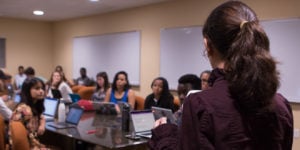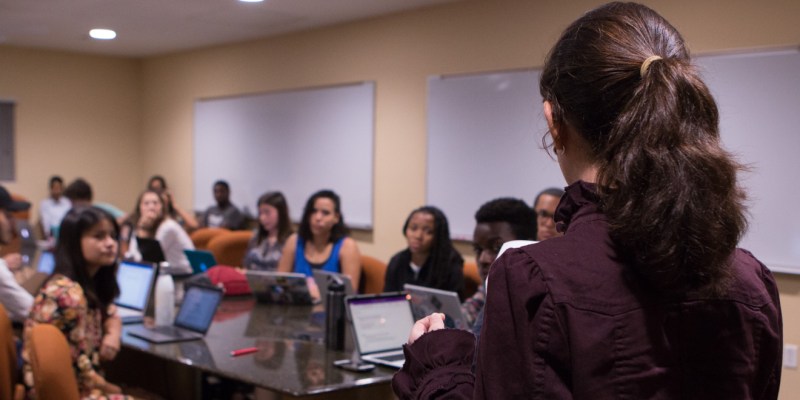In its ninth meeting, the 19th Undergraduate Senate discussed campus policies and resources for students with disabilities, heard proposals for a community town hall on the social and political climate at Stanford and voted on funding requests from student groups.
Resources for students with disabilities

The meeting opened with a discussion led by Zina Jawadi ’18, disability lead on the ASSU executive cabinet committee.
“In our society, people with disabilities are invisible,” Jawadi said, outlining the fundamental problem she hopes to solve.
According to Jawadi, between 12-15% of Stanford students are registered as having some kind of disability, yet awareness of disability on campus is relatively low.
Disabled students face many obstacles in campus life, great and small, Jawadi said. She pointed out that while most housing on the Row is on the second and third floors, these buildings do not have elevators. She went on to discuss the barriers that students with disabilities face participating in many community building events hosted by dorm and student group, such as hikes and scavenger hunts. According to Jawadi, many disabled students are reluctant to share their status with their peers.
To alleviate these concerns, Jawadi said the disability committee aims to create a permanent space on campus for disabled students, improve RA training and increase awareness and advocacy for people with disabilities at Stanford.
To that end, Jawadi requested co-sponsorship from ASSU, financial support and a permanent space to increase accessibility on campus.
Some senators, such as Lizzie Ford ’20, expressed concerns over the group’s ability to reach out to people who already do not feel comfortable in the community.
“Something we do in Power2Act, stories we share in meetings are confidential,” Jawadi responded. “We have more private meetings and people would feel comfortable going into such spaces.”
After the preliminary discussion with Jawadi, the Senate will continue to explore possible reforms and resources for students with disabilities.
Committee updates
The Academic Affairs Committee proposed the addition of a mental health class to the school curriculum, as well as new ways of increasing the availability of financial aid to purchase textbooks.
Committee Communications Chair Lark Wang ’20 also announced a planned town hall meeting with the students of Stanford about the current political and social climate on campus, most likely during week 6 of fall quarter.
Funding requests and other business
Despite the short notice, the Senate voted to approve a J Street U request for funding to build a sukkot in White Plaza in honor of the Jewish holiday of the same name to promote awareness on the Israeli-Palestinian Conflict. Alpha Phi Alpha also received funding for a fundraising event that will donate its proceeds to a scholarship for disadvantaged youths.
Finally, the Senate adjusted its bylaws to reflect new reforms to the funding of the university and proposed a vote to reconstitute a committee on sexual violence prevention in response to changes in Title IX policy under the Trump administration. The vote will take place next week.
Contact Michael Whittaker at mwhittak ‘at’ stanford.edu.
Correction: An earlier version of this article mistakenly stated that the Zina Jawadi was president of Power2Act — a role that she passed on to Brian Tuttle ’20 last year — and attributed a mission statement written by the ASSU disability committee to Power2Act. The Daily regrets these errors.
